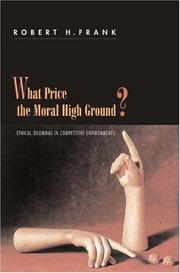| Listing 1 - 10 of 54 | << page >> |
Sort by
|
Book
ISBN: 9780691232713 Year: 2021 Publisher: Princeton, NJ
Abstract | Keywords | Export | Availability | Bookmark
 Loading...
Loading...Choose an application
- Reference Manager
- EndNote
- RefWorks (Direct export to RefWorks)

ISBN: 0071194614 0072483342 9780072483345 Year: 2003 Publisher: Boston, Mass. McGraw Hill
Abstract | Keywords | Export | Availability | Bookmark
 Loading...
Loading...Choose an application
- Reference Manager
- EndNote
- RefWorks (Direct export to RefWorks)
Microeconomics --- Economic man --- Self-interest --- Consumer behavior --- Examinations, questions, etc --- Examinations, questions, etc.

ISBN: 0393026043 0393960226 9780393960228 9780393026047 Year: 1988 Publisher: New York (N.Y.): Norton
Abstract | Keywords | Export | Availability | Bookmark
 Loading...
Loading...Choose an application
- Reference Manager
- EndNote
- RefWorks (Direct export to RefWorks)
The "Me" generation has justified itself by appealing to social scientists who see selfishness as the only rational basis for action. But what are we to make of selfless acts in business, personal life, even politics? In this provocative book, Robert Frank shows us that looking out for Number One may require that we look out for others, too. He finds his evidence in our emotional acts. Like the blush on telling a lie, they can serve as hard-to-fake signals of a commitment to social values. We recognize these signs; we know people we trust; and if we can identify trustworthy fellows we can reject those who do not merit our faith.
Social ethics --- Affective and dynamic functions --- 174.5 --- Altruism --- Emotions --- Ethics --- Motivation (Psychology) --- Rationalism --- -Knowledge, Theory of --- Religion --- Belief and doubt --- Deism --- Free thought --- Realism --- Action, Psychology of --- Drive (Psychology) --- Psychology of action --- Psychology --- Deontology --- Ethics, Primitive --- Ethology --- Moral philosophy --- Morality --- Morals --- Philosophy, Moral --- Science, Moral --- Philosophy --- Values --- Feelings --- Human emotions --- Passions --- Affect (Psychology) --- Affective neuroscience --- Apathy --- Pathognomy --- Altruistic behavior --- Unselfishness --- Conduct of life --- Charity --- Helping behavior --- Economische ethiek. Speculatie --- Psychological aspects --- -Economische ethiek. Speculatie --- 174.5 Economische ethiek. Speculatie --- Altruisme --- Emoties --- Ethiek --- Ethique --- Gevoelens --- Motivatie (Psychologie) --- Motivation (Psychologie) --- Passies --- Sentiments --- Émotions --- Émotivité --- -Action, Psychology of --- Emotions. --- Altruism. --- Ethics. --- Éthique --- Morale --- Motivation (psychologie) --- Rationalisme --- Psychological aspects. --- Knowledge, Theory of --- Rationalism - Psychological aspects. --- Morale. --- Émotions. --- Altruisme. --- Rationalisme. --- Rationalism - Psychological aspects --- Émotions.

ISBN: 0691006725 9780691006727 Year: 2004 Publisher: Princeton (N.J.) Princeton university press
Abstract | Keywords | Export | Availability | Bookmark
 Loading...
Loading...Choose an application
- Reference Manager
- EndNote
- RefWorks (Direct export to RefWorks)
Economic order --- Professional ethics. Deontology --- Business ethics --- Success in business --- Cooperativeness --- Social responsibility of business --- Competition --- Moral and ethical aspects --- 174 --- AA / International- internationaal --- 658.330 --- 173 --- 170 --- 650 --- Beroepsethiek. Beroepsmoraal. Deontologie van het beroep --- Bijzondere vraagstukken in verband met personeel: algemeenheden. --- Ethiek van de verschillende beroepen. Plichtenleer. Deontologie. --- Moraal en ethiek (algemeenheden). --- Theorieën en grondbeginselen. Management. --- Verband tussen de ethiek en de economie. Ethiek en bedrijf. --- Bedrijfsethiek --- Bedrijfsethiek. --- 174 Beroepsethiek. Beroepsmoraal. Deontologie van het beroep --- Business --- Corporate accountability --- Corporate responsibility --- Corporate social responsibility --- Corporations --- CSR (Corporate social responsibility) --- Industries --- Social responsibility, Corporate --- Social responsibility of industry --- Issues management --- Cooperation (Ethics) --- Competition (Economics) --- Competitiveness (Economics) --- Economic competition --- Commerce --- Conglomerate corporations --- Covenants not to compete --- Industrial concentration --- Monopolies --- Open price system --- Supply and demand --- Trusts, Industrial --- Businesspeople --- Commercial ethics --- Corporate ethics --- Corporation ethics --- Professional ethics --- Wealth --- Business failures --- Creative ability in business --- Prediction of occupational success --- Moraal en ethiek (algemeenheden) --- Ethiek van de verschillende beroepen. Plichtenleer. Deontologie --- Verband tussen de ethiek en de economie. Ethiek en bedrijf --- Theorieën en grondbeginselen. Management --- Bijzondere vraagstukken in verband met personeel: algemeenheden --- Social responsibility --- Social aspects --- Economic aspects --- Cooperativeness - Moral and ethical aspects
Book
ISBN: 9780753513385 0753513382 Year: 2008 Publisher: London Virgin
Abstract | Keywords | Export | Availability | Bookmark
 Loading...
Loading...Choose an application
- Reference Manager
- EndNote
- RefWorks (Direct export to RefWorks)
Have you ever wondered why there is a light in your fridge but not in your freezer? Or why 24-hour shops bother having locks on their doors? Or why soft drink cans are cylindrical, but milk cartons are square? The answer is simple: economics. For years, economist Robert Frank has been encouraging his students to ask questions about the conundrums and strange occurrences they encounter in everyday life and to try to explain them using economics. Now in this bestselling book, he shares the most intriguing - and bizarre - questions and the economic principles that answer them to reveal why many of the most puzzling parts of everyday life actually make perfect (economic) sense.
Book
ISBN: 9780073375946 0073375942 9780070166745 0070166749 Year: 2010 Publisher: New York McGraw-Hill
Abstract | Keywords | Export | Availability | Bookmark
 Loading...
Loading...Choose an application
- Reference Manager
- EndNote
- RefWorks (Direct export to RefWorks)
Microeconomics --- Economic man --- Self-interest --- Consumer behavior --- Examinations, questions, etc --- Examinations, questions, etc. --- AA / International- internationaal --- 330.00 --- 338.00 --- 339.320 --- 380.20 --- Economische en sociale theorieën: algemeenheden. --- Theorie van de productie. --- Consumptie: algemeenheden. Wet van de vraag in verband met de consumptie. Consumptiebehoefte. Behoeftetheorie. --- Prijstheorieën: algemeenheden. --- Conduct of life --- Self --- NIMBY syndrome --- Price theory --- Economics --- Homo oeconomicus --- Human beings --- Behavior, Consumer --- Buyer behavior --- Decision making, Consumer --- Human behavior --- Consumer profiling --- Market surveys --- Economische en sociale theorieën: algemeenheden --- Theorie van de productie --- Consumptie: algemeenheden. Wet van de vraag in verband met de consumptie. Consumptiebehoefte. Behoeftetheorie --- Prijstheorieën: algemeenheden

ISBN: 0195035208 9780195035209 Year: 1985 Publisher: Oxford Oxford university press
Abstract | Keywords | Export | Availability | Bookmark
 Loading...
Loading...Choose an application
- Reference Manager
- EndNote
- RefWorks (Direct export to RefWorks)
Economics --- Welfare economics --- Wages --- Social status --- 330.1 --- Economic policy --- Social policy --- Compensation --- Departmental salaries --- Earnings --- Pay --- Remuneration --- Salaries --- Wage-fund --- Wage rates --- Working class --- Income --- Labor costs --- Compensation management --- Cost and standard of living --- Prices --- Social standing --- Socio-economic status --- Socioeconomic status --- Standing, Social --- Status, Social --- Power (Social sciences) --- Prestige --- Economic theory --- Political economy --- Social sciences --- Economic man --- Economische grondbegrippen. Algemene begrippen in de economie --- 330.1 Economische grondbegrippen. Algemene begrippen in de economie
Book
ISBN: 9780691146935 0691146934 Year: 2010 Publisher: Princeton (N.J.) : Princeton University Press,
Abstract | Keywords | Export | Availability | Bookmark
 Loading...
Loading...Choose an application
- Reference Manager
- EndNote
- RefWorks (Direct export to RefWorks)
Consumption (Economics) --- Wealth --- Consumer behavior --- Luxury --- Competition --- Consumption (Economics) - United States --- Wealth - United States --- Consumer behavior - United States --- Competition - United States
Book
ISBN: 9780691167404 0691167400 1400880270 0691178305 Year: 2016 Publisher: Princeton, N.J. Princeton University Press
Abstract | Keywords | Export | Availability | Bookmark
 Loading...
Loading...Choose an application
- Reference Manager
- EndNote
- RefWorks (Direct export to RefWorks)
From New York Times bestselling author and economics columnist Robert Frank, a compelling book that explains why the rich underestimate the importance of luck in their success, why that hurts everyone, and what we can do about itHow important is luck in economic success? No question more reliably divides conservatives from liberals. As conservatives correctly observe, people who amass great fortunes are almost always talented and hardworking. But liberals are also correct to note that countless others have those same qualities yet never earn much. In recent years, social scientists have discovered that chance plays a much larger role in important life outcomes than most people imagine. In Success and Luck, bestselling author and New York Times economics columnist Robert Frank explores the surprising implications of those findings to show why the rich underestimate the importance of luck in success-and why that hurts everyone, even the wealthy.Frank describes how, in a world increasingly dominated by winner-take-all markets, chance opportunities and trivial initial advantages often translate into much larger ones-and enormous income differences-over time; how false beliefs about luck persist, despite compelling evidence against them; and how myths about personal success and luck shape individual and political choices in harmful ways.But, Frank argues, we could decrease the inequality driven by sheer luck by adopting simple, unintrusive policies that would free up trillions of dollars each year-more than enough to fix our crumbling infrastructure, expand healthcare coverage, fight global warming, and reduce poverty, all without requiring painful sacrifices from anyone. If this sounds implausible, you'll be surprised to discover that the solution requires only a few, noncontroversial steps.Compellingly readable, Success and Luck shows how a more accurate understanding of the role of chance in life could lead to better, richer, and fairer economies and societies.
Economic sociology --- sociale ongelijkheid --- 301.17 --- Economics --- Merit (Ethics) --- Success --- Fortune --- Economics. --- Psychological aspects. --- Sociological aspects. --- Economic aspects. --- Psychological aspects --- Sociological aspects --- Economic aspects

ISBN: 0691070113 Year: 1999 Publisher: Princeton Princeton University Press
Abstract | Keywords | Export | Availability | Bookmark
 Loading...
Loading...Choose an application
- Reference Manager
- EndNote
- RefWorks (Direct export to RefWorks)
659 <73> --- Wealth --- -Luxury. --- Consumption (Economics) --- -Competition --- -Competition (Economics) --- Competitiveness (Economics) --- Economic competition --- Commerce --- Conglomerate corporations --- Covenants not to compete --- Industrial concentration --- Monopolies --- Open price system --- Supply and demand --- Trusts, Industrial --- Economics --- Cost and standard of living --- Leisure class --- Affluence --- Distribution of wealth --- Fortunes --- Riches --- Business --- Finance --- Capital --- Money --- Property --- Well-being --- 659 <73> Publicity. Information work. Public relations--Verenigde Staten van Amerika. VSA. USA --- Publicity. Information work. Public relations--Verenigde Staten van Amerika. VSA. USA --- Competition (Economics) --- Economic aspects --- -Economics --- Competition --- National wealth --- United States --- -Luxury --- United States of America
| Listing 1 - 10 of 54 | << page >> |
Sort by
|

 Search
Search Feedback
Feedback About UniCat
About UniCat  Help
Help News
News